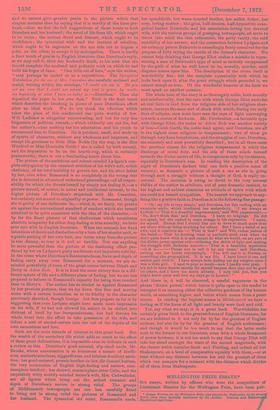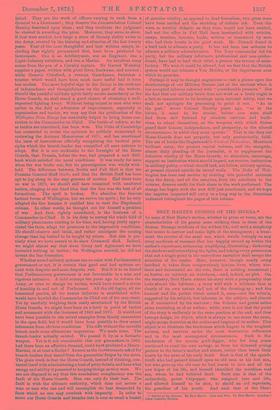WELLINGTON PRIZE ESSAYS.* Six essays, written by officers who were
the competitors of Lieutenant Maurice for the Wellington Prize, have been pub-
* Essays Written /be' the Wellington Prise, and selected for Publication by his Grace Desire from those vett:air mentioned by (he Arbiter. London and EdInbor Blackwood and Bons. lished. They are the work of officers varying in rank from a General to a Lieutenant ; they deserve the commendation Colonel Hawley bestowed upon them ; and they vindicate the judgment he showed in awarding the prize. Moreover, they serve to show, if that were needed, how large a store of literary ability exists in the Army, created by the training and stimulus of the last twenty years. Four of the most thoughtful and best written essays, in- cluding that rightly pronounced first, have been produced by lieutenants. One is an Artilleryman, one an Engineer, one a Light-Infantry subaltern, and one a Marine. An excellent essay comes from the pen of a Cavalry captain. Sir Garnet Wolseley supplies a paper, written with great force; frankness, and acumen ; while General Craufurd, a veteran Guardsman, furnishes a treatise which would have been much more useful had it been less modest. The most hopeful sign in the Essays is the evidence of independence and thoughtfulness on the part of the writers. Should the youthful military spirit fairly secure ascendancy at the Horse Guards, we shall stand a good chance of obtaining a well- organised fighting Army. Without being unjust to men who were earlier in the field as advocates of improvement, especially in organisation and tactics, we may say that the publication of the Wellington Prize Essays has materially helped to bring home con- viction to the Commander-in-Chief. The battle of reform, so far as tactics are concerned, has been won. The Duke of Cambridge has consented to revise the opinions he publicly enunciated in reviewing the Autumn Manoeuvres of 1871, and has sanctioned the issue of instructions officially recognising the tactical prin- ciples which the breech-loader has compelled all sane nations to adopt. But it is not creditable to the foresight of the Horse Guards, that Prussia, before the war, had prepared a new drill- book which satisfied the novel conditions. It was ready for issue when the war broke out, but its promulgation was wisely with- held. The difference between Berlin and Pall Mall is that the Prussian General Staff thinks, and that the British Staff has been apt to jog along in the easy grooves of routine. Had there been no war in 1870, we should still have remained with unaltered tactics, clinging to one fixed idea that the line was the best of all formations. The spell is broken. We abandon the famous tactical forms of Wellington, but we revive his spirit ; for he only adopted the line because it enabled him to rout the Napoleonic column. In other words, he thought out for himself a problem of war. And that, rightly considered, is the business of a Commander-in-Chief. It is his duty to survey the whole field of military phenomena existing in his time, and, having justly appre- ciated the facts, adapt his processes to the imperative conditions. He should observe and think, and rather anticipate the coming change than lag behind to be taught by others. But this is pre- cisely what we have ceased to do since Cromwell died. Indeed, we might almost say that since Crecy and Agincourt we have invented nothing in tactics ; for Wellington revived, he did not invent the line formation.
Whether sound military systems can co-exist with Parliamentary government or not, it is certain that good and bad systems co- exist with despotic and semi-despotic rule. But it is to be feared that Parliamentary government is not favourable to a wise and vigorous initiative. A bold attempt ten years ago to reform the Army, or even to change its tactics, would have roused a storm of hostility in and out of Parliament. All the old fogies, all the interested parties, all the honest believers in established order, would have howled the Commander-in-Chief out of his arm-chair. Yet by carefully weighing facts easily ascertained by the British Horse Guards, we might have been on a level in point of tactics and armament with the Germans of 1866 and 1870. It would not have been possible to cite actual examples from bloody encounters in the open field, but it would have been possible to draw sound inferences from obvious conditions. The rifle without the movable breech made some alterations imperative. We made none. The breech-loader actually existed. We passed it by as a fantastic weapon. Yet is it not conceivable that our gunmakers in 1862, had there been an effective demand, could have produced a Henry- Martini, or at least a Snider? As soon as the Governments asked for breech-loaders they issued from the gunsmiths' forges by the score. The plain truth is that the Horse Guards, instead of thinking, con- tented itself with administering a host of petty details, and bent what energy and ability it possessed to keeping things as they were. We are not disposed to say that this nonchalant complacency was the fault of the Horse Guards. Men can only do their best. The fault is with the ultimate authority, which does not secure a man or men who can and will accomplish the best demanded by facts which no one may overlook with impunity. In order to move our Horse Guards and breathe into it ever so small a breath
of genuine vitality, as opposed to dead formalism, two great wars have been needed and the shedding of infinite ink. Even the wars, so terribly didactic as they were, would not have availed, had not the office in Pall Mall been bombarded with articles, essays, treatises, lectures, books, written or translated by men who had their hearts in the good work. Mr. Disraeli found it a hard task to educate a party. It has not been less arduous to educate a military administration. The Tory commander led his party, but the military reformers, professional and non-profes- sional, have had to lead their chief, a process the reverse of satis- factory. We wish it could be altered, but we fear that the British system would not tolerate a You Moltke, or the department over- which he presides.
Perhaps it may be thought ungracious to cast a glance upon the shortcomings of our Military Bureau just at the moment when it has accepted reforms enforced with "considerable pressure." But the fact that our military brain does not work as a brain ought is a fact so momentous in its bearings upon national safety, that we shall not apologise for presuming to point it out. "As in the past," wrote Colonel Hamley years ago, "so in the future, it must be for armies, before new wars shalt find them still fettered by obsolete customs and tradi- tions, to adapt themselves, as the weapons with which States guard their honour, independence, and prosperity, to the altered circumstances in which they must operate." That is the duty our- Horse Guards does not properly, but only perfunctorily, fulfil- The use of books like Boguslawski's Tactical Deductions, Maurice's brilliant essay, the present capital volume, and the energetic, almost daily pleading of the journalist, is to supplement the defective vitality of the Horse Guards, to stimulate, encourage, support an institution which should impart, not receive, instruction in military policy,—which should lead, not follow, military opinion, at present ripened outside its sacred walls. The Duke of Wel- lington has done real service by eliciting this powerful outburst from the Army, and all the essayists, from the subaltern to the veteran, deserve credit for their share in the work performed. The- change has begun with the new drill just sanctioned, and we hope the impetus imparted will carry us a long way in the directions indicated throughout the pages of this volume.



































 Previous page
Previous page